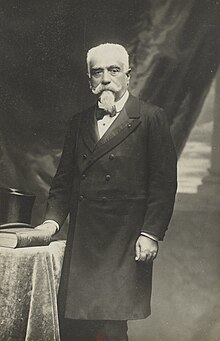- ↑ "Villa, Tommaso". treccani. Enciclopedia Italiana. Retrieved 29 September 2023.
- ↑ Moreni, Leonardo (1915). Relazione Statistica dei Lavori Compiuti dalla Corte di Cassazione di Torino nell'anno 1914-1915 (PDF). Turin: Tipografia S. Giuseppe. Retrieved 29 September 2023.
- ↑ "Tommaso Villa". gazzettauffuciale.it. Gazzetta Ufficiale del Regno d’Italia. Retrieved 29 September 2023.
- 1 2 3 4 5 "Il Presidente Tommaso Villa". camera.it. Camera dei Deputati. Retrieved 29 September 2023.
- 1 2 3 4 5 6 "BILLA, Tommaso". senato.it. Senato Della Repubblica. Retrieved 30 September 2023.
- 1 2 3 4 5 6 7 Montaldo, Silvano. "VILLA, Tommaso". treccani.it. Dizionario Biografico degli Italiani. Retrieved 30 September 2023.
- 1 2 3 "Tommaso Villa". storia.camera.it. Camera dei Deputati. Retrieved 30 September 2023.
- ↑ "Lidia Poët, la prima donna Avvocato in Italia era piemontese". 100torri.it. CentoTorri. Retrieved 30 September 2023.
- ↑ Hoyle, Mark S. W. (May 1987). "The Mixed Courts of Egypt, 1906-1915" (PDF). Arab Law Quarterly. 2 (2): 166–184. JSTOR 3381347 . Retrieved 29 September 2023.
- ↑ Cordova, Ferdinando (2011). Massoneria e Politica in Italia, 1892-1908. Milan: Carte Scoperte. p. 229.
- ↑ Mola, Alessandro (2018). Storia della Massoneria in Italia dal 1717 al 2018. Florence: Bompiani-Giunti. p. 358.
- ↑ Della Coletta, Cristina (2006). World's Fairs Italian-Style The Great Expositions in Turin and Their Narratives, 1860-1915. Toronto: University of Toronto. p. 46. ISBN 9781442658097 . Retrieved 30 September 2023.
- ↑ Onger, Sergio (2010). Verso la modernità. I bresciani e le esposizioni industriali 1800-1915. Milan: Franco Angeli Edizione. p. 329. ISBN 9788856827255 . Retrieved 30 September 2023.
- ↑ Bispo, Antonio Alexandre. "Mostra italo-brasiliana na Esposizione nazionale italiana de 1898 em Turim". revista.brasil-europa.37. Revista Brasil-Europa - Correspondência Euro-Brasileira. Retrieved 30 September 2023.
- ↑ "Tommaso Villa (Canale, Cuneo, 1832 - Torino 1915)". museotorino.it. Museo Torino. Retrieved 30 September 2023.
This page is based on this Wikipedia article
Text is available under the CC BY-SA 4.0 license; additional terms may apply.
Images, videos and audio are available under their respective licenses.
Text is available under the CC BY-SA 4.0 license; additional terms may apply.
Images, videos and audio are available under their respective licenses.
Tommaso Villa | |
|---|---|
 | |
| President of the Chamber of Deputies | |
| In office 10 June 1895 –2 March 1897 |